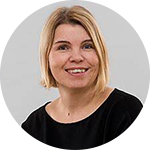-
Understanding arthritis
-
Kerstin Klein’s work at the Center for Experimental Rheumatology at University Hospital Zurich involves research into different forms of rheumatoid arthritis. Her aim is to create the basis for targeted treatment.
-
 „I can enjoy my breakfast again.“
„I can enjoy my breakfast again.“For months, 41-year-old Susanne Ort* had to get up an hour early to make sure she was in the office on time. Everything took her longer because her body was so stiff and inflexible in the morning. Her wrists and certain joints in her fingers and feet were painful and swollen. Her rings no longer fit.
Susanne Ort’s symptoms are the first signs of rheumatoid arthritis, a chronic inflammation of the joints. It affects around 70,000 people in Switzerland, three times as many women as men. Although in the majority of cases the condition develops between the ages of 35 and 50, rheumatoid arthritis can afflict anyone.
When Susanne Ort went to her family doctor, he noticed that not only were her joints swollen, but that there were elevated inflammatory markers in her blood. He referred her to a rheumatologist, who discussed many different therapy options with her. The thing is that so far it hasn’t been possible to tell clearly what therapy works best for what patients.
“Many patients have to try a number of therapies before they find the right one,” says biologist Kerstin Klein. Since 2010 she’s been doing research into the molecular basis of rheumatoid arthritis at the Center for Experimental Rheumatology at University Hospital Zurich. She wants to better understand why the immune system is led so far astray that it attacks its own body and destroys joints. She’s also looking into the different courses arthritis can take.
“In around 70% of cases we observe special antibodies in the blood,” explains Klein. Patients with these so-called anti-citrullinated protein antibodies (ACPAs) suffer less serious initial symptoms. But over the long term these patients experience significantly worse damage to their joints.
Klein is examining joint samples in an attempt to lay the foundation for more targeted treatment of arthritis. She hopes to find measurable biological parameters, so-called biomarkers, that characterize the disease and can predict what drugs a particular person will respond to.
Kerstin Klein’s search is possible thanks, among other things, to a donation from the Iten Kohaut Foundation to the USZ Foundation. This gives her the freedom to do research that one day will help find the right therapy for patients like Susanne Ort more quickly.
*anonymized
-
70% financed

-
-
Project management
-
-

Dr. Kerstin Klein
Center for Experimental Rheumatology
Department of Rheumatology
University Hospital Zurich
-
-
Supporting partner
-
-
Iten Kohaut Foundation
